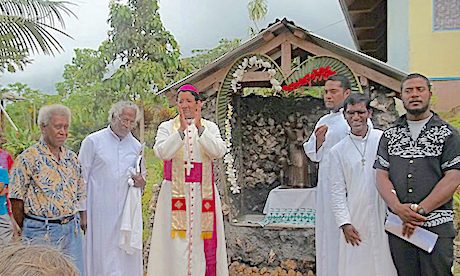Climate change threatens to displace i-Kiribati, the people of the low-lying atoll nation of Kiribati.
However if relocation proves necessary it will not be the first time that i-Kiribati have found themselves, en-mass, in a ‘strange’ land.
The recently appointed Apostolic delegate to the Solomon Islands, Archbishop Mathew Kurian Vayalunkal received at a true i-Kiribati welcome when he visited the parish of St. Eusebius, Noro.
In Caanan he was honoured with floral wreaths, speeches, dances and gifts at the ‘Maneaba’ (meeting house).
The people have been resettled by the British from the then Gilbert islands several decades ago.
In 1930s, because of over crowding 700 i-Kiribati moved to three atolls in the uninhabited Phoenix-islands group in the extreme south of Kiribati.
But in the early 1950s, after repeated droughts and associated water shortages, the British authorities made the decision to re-relocate the settlers.
Solomon Islands was chosen on the basis that it was more sparsely populated than Kiribati.
The first wave of i-Kiribati arrived in the Western Province in 1953. They were assigned land to the west of Gizo town on Gizo Island.
Today pockets, or sub-communities, of i-Kiribati are found scattered across the Western Province, especially in Gizo Island, Waghena Island, and in the villages of Canaan, Rawaki on Kohingo Island, and Baeroko to the north of Noro.
Vayalunkal presented his credentials to the Governor General of Solomon Islands, Frank Kabui, on Thursday Feb 9th.
Pope Francis named Vayalunkal as the Apostolic Nuncio to Papua New Guinea and the Solomon Islands in September 2016
The 49-year-old has been in the Vatican diplomatic service since 1998. He served in Guinea Conakry, Korea, Dominican Republic, Bangladesh, Hungary and in Egypt.
In 2010, after the earthquake in Haiti, he was sent there for few months to assist the humanitarian support of the Holy See.
Source
Additional readingNews category: Asia Pacific.




